|
|
|
Sort Order |
|
|
|
Items / Page
|
|
|
|
|
|
|
| Srl | Item |
| 1 |
ID:
107911
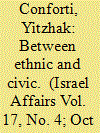

|
|
|
|
|
| Publication |
2011.
|
| Summary/Abstract |
This article addresses two basic issues of the Zionist vision: 1. Was the Jewish state planned as an ethnic or civic state? 2. What was the character of the Zionist vision? Was it a holistic utopian vision, or a minimalist vision for creating a Jewish national state? This research concludes that the state of Israel, which developed from a nationalist ethnic-cultural movement, integrated within it ethnic values as well as Western civic values. The founders of the central wing of the movement all aspired to create a Jewish national state that upheld these values. Furthermore, the planning of the Zionist Utopia by the central group of the Zionist leadership was usually realistic and minimalist, not holistic. This position enabled the leadership to strike a balance between vision and reality, and to address the historical circumstances on the path toward establishment of the state.
|
|
|
|
|
|
|
|
|
|
|
|
|
|
|
|
| 2 |
ID:
120360
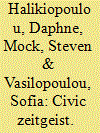

|
|
|
|
|
| Publication |
2013.
|
| Summary/Abstract |
This article examines the relationship between nationalism and liberal values and, more specifically, the redefinition of boundaries between national communities and others in the rhetoric of radical right parties in Europe. The aim is to examine the tension between radical right party discourse and the increasing need to shape this discourse in liberal terms. We argue that the radical right parties that successfully operate within the democratic system tend to be those best able to tailor their discourse to the liberal and civic characteristics of national identity so as to present themselves and their ideologies as the true authentic defenders of the nation's unique reputation for democracy, diversity and tolerance. Comparing the success of a number of European radical right parties ranging from the most electorally successful Swiss People's Party, the Dutch Pim Fortuyn List and Party for Freedom to the more mixed French Front National, British National Party and National Democratic Party of Germany we show that the parties that effectively deploy the symbolic resources of national identity through a predominantly voluntaristic prism tend to be the ones that fare better within their respective political systems. In doing so, we challenge the conventional view in the study of nationalism that expects civic values to shield countries from radicalism and extremism.
|
|
|
|
|
|
|
|
|
|
|
|
|
|
|
|
| 3 |
ID:
107273
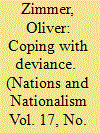

|
|
|
|
|
| Publication |
2011.
|
| Summary/Abstract |
This article highlights two processes that shaped Swiss nationhood in the long nineteenth century. The first concerns the competition between different nation-states and the nationalist visions these contests engendered. In a Europe dominated by the norm of the culturally and ethnically homogenous nation, the Swiss authorities, public intellectuals and various political representatives were desperate to display an image of national authenticity to the outside world. The result was a nationalism that combined voluntaristic and organic elements. In the second and main part of this article, the focus turns on citizenship; it is conceived not only as a social and legal institution, but also as a cognitive prism through which people defined their membership in the national community. Remarkably, the authority in granting national citizenship to foreign nationals remained firmly in the hands of the cantons and, above all, the Swiss municipalities. In practical terms, this meant that the Gemeinde provided the institutional and cognitive frame through which nationhood was primarily experienced, imagined and defined. While Switzerland represents a particularly strong case of a communalist polity, it should not be treated as unique. Instead, it should alert us to a potentially fertile yet little-explored area of research: what might be called the communal embededdness of the national(ist) imagination.
|
|
|
|
|
|
|
|
|
|
|
|
|
|
|
|
| 4 |
ID:
095094
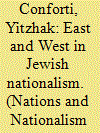

|
|
|
|
|
| Publication |
2010.
|
| Summary/Abstract |
This article analyses the ethnic and civic components of the early Zionist movement. The debate over whether Zionism was an Eastern-ethnic nationalist movement or a Western-civic movement began with the birth of Zionism. The article also investigates the conflict that broke out in 1902 surrounding the publication of Herzl's utopian vision, Altneuland. Ahad Ha'am, a leader of Hibbat Zion and 'Eastern' cultural Zionism, sharply attacked Herzl's 'Western' political Zionism, which he considered to be disconnected from the cultural foundations of historical Judaism. Instead, Ahad Ha'am supported the Eastern Zionist utopia of Elchanan Leib Lewinsky. Hans Kohn, a leading researcher of nationalism, distinguished between 'Eastern' and 'Western' nationalist movements. He argued that Herzl's political heritage led the Zionist movement to become an Eastern-ethnic nationalist movement. The debate over the character of Jewish nationalism - ethnic or civic - continues to engage researchers and remains a topic of public debate in Israel even today. As this article demonstrates, the debate between 'Eastern' and 'Western' Zionism has its foundations in the origins of the Zionist movement. A close look at the vision held by both groups challenges Kohn's dichotomy as well as his understanding of the Zionist movement.
|
|
|
|
|
|
|
|
|
|
|
|
|
|
|
|
| 5 |
ID:
086232
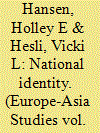

|
|
|
|
|
| Publication |
2009.
|
| Summary/Abstract |
We challenge the civic-ethnic dichotomy drawn by previous authors and propose a four-category typology of identities based on out-group tolerance and in-group attachment. Drawing from work on national identity formation and nation-building, we test hypotheses about the processes that cause individuals to adopt one identity over others using survey data based on representative samples of five ethnic groups in Ukraine. We find that the effects of socialisation processes vary greatly depending upon ethnic group. Our results challenge some long-held assumptions about the potential destabilising effects of 'ethnic' identities and the degree to which 'civic' identities correspond to values and behaviours supportive of democracy.
|
|
|
|
|
|
|
|
|
|
|
|
|
|
|
|
| 6 |
ID:
095090
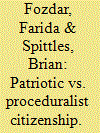

|
|
|
|
|
| Publication |
2010.
|
| Summary/Abstract |
The relationship of the individual to the nation-state is often conceived by theorists in terms of either an emotional ethno-cultural bond (to the traditional 'nation'), or a civic legal-rational connection (to the 'state'). Such a distinction is fundamentally problematic for settler nations with diverse migrant populations. Australia is such a society built on the integration of migrants into an increasingly multicultural polity. The role of citizenship in this process of integration and nation-building is contested. As in other Western democracies, recent moves to increase the value and uptake of citizenship by eligible residents have occurred using discourses of ethno-cultural patriotism. Yet little is known about how migrants to Australia view citizenship. Australian political scientists Betts and Birrell (2007) have argued that most Australians envisage citizenship in terms of monocultural patriotic commitment, while government and the intellectual elite take a more civic 'proceduralist' approach. To explore the validity of this dichotomy, and its relevance to migrants, we analyse migrants' constructions of Australian citizenship from two sources, a government website and interviews, finding evidence of both patriotism and proceduralism, but significant overlap in the way the perspectives are articulated. Differences between the data sets, in representations of economic productivity, identity and exclusion, are also discussed. We conclude that everyday conceptualisations of Australian citizenship by migrants combine patriotism and proceduralism, and indicate a degree of complexity and ambivalence missing in Betts and Birrell's formulation.
|
|
|
|
|
|
|
|
|
|
|
|
|
|
|
|
| 7 |
ID:
089369
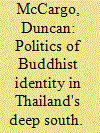

|
|
|
|
|
| Publication |
2009.
|
| Summary/Abstract |
This article sets out to criticise arguments by scholars such as Charles Keyes and Donald Swearer, who have framed their readings of Thai Buddhism through a lens of 'civic' or 'civil' religion. Drawing on fieldwork conducted in the southern border provinces, the paper argues that religious tolerance is declining in Thailand, and that anti-Muslim fears and sentiments are widespread among Buddhists. Some southern Buddhists are now arming themselves, and are creating militia groups in the face of growing communal violence. In the rest of Thailand, hostility towards Muslims, coupled with growing Buddhist chauvinism, is being fuelled by developments in the south.
|
|
|
|
|
|
|
|
|
|
|
|
|
|
|
|
| 8 |
ID:
128764
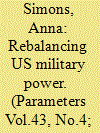

|
|
|
|
|
| Publication |
2013-14.
|
| Summary/Abstract |
For all attention paid to partnering too little goes into what “partnering” might mean from ostensible partners' point of view. In the 21st century, sensitivities and sensibilities matter. So do economic realities. The US military should make better strategic use of military Adviser to help foreign security services professionalize- something the United States can only do if foreign militaries are willing to engage in civic action themselves.
|
|
|
|
|
|
|
|
|
|
|
|
|
|
|
|
| 9 |
ID:
154459
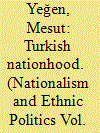

|
|
|
|
|
| Summary/Abstract |
This article challenges two established views in the literature on Turkish nationalism. First, that Turkish nationhood in the early republican era was civic and ethnic and, second, that, while Turkish nationhood was inclusive and egalitarian in constitutional texts, in the early years of the Turkish Republic and in the case of Turkish citizens of Muslim origin, it became exclusive or discriminatory in citizenship practices once the Republic was consolidated and in the case of non-Muslim Turkish citizens. Contra these two established views, I first argue that Turkish nationhood was not civic and ethnic, but it was actually civic and ancestral and cultural. Secondly, relying on an examination of legal texts produced and citizenship practices pursued in the years between 1918 and 1924, I argue that the Turkish nationhood was exclusive and discriminatory both theoretically and practically, on paper as well as in practice, both at the time of the foundation of the republic and once the regime had become consolidated.
|
|
|
|
|
|
|
|
|
|
|
|
|
|
|
|
|
|
|
|
|